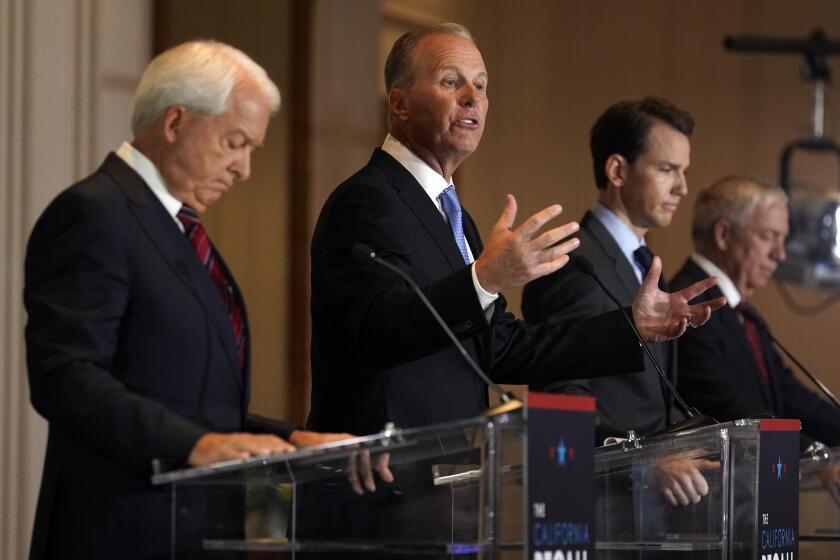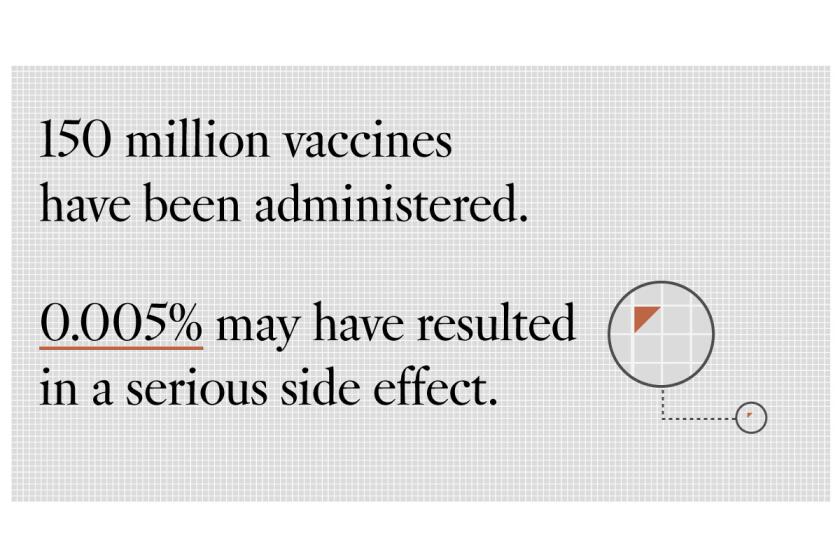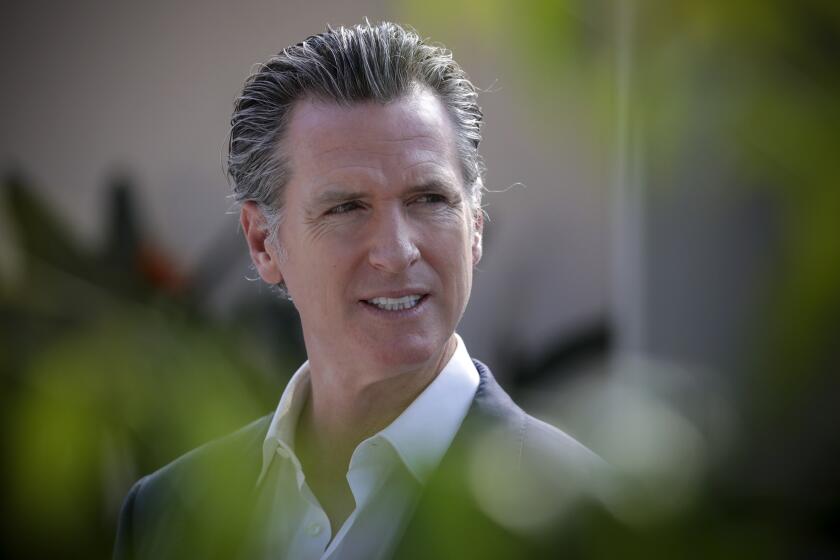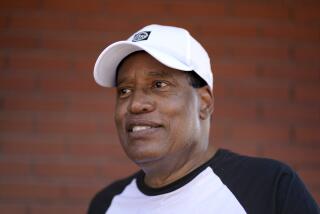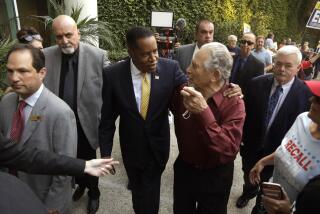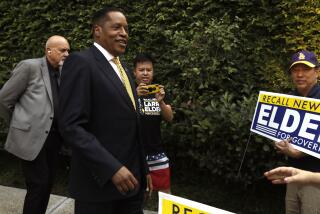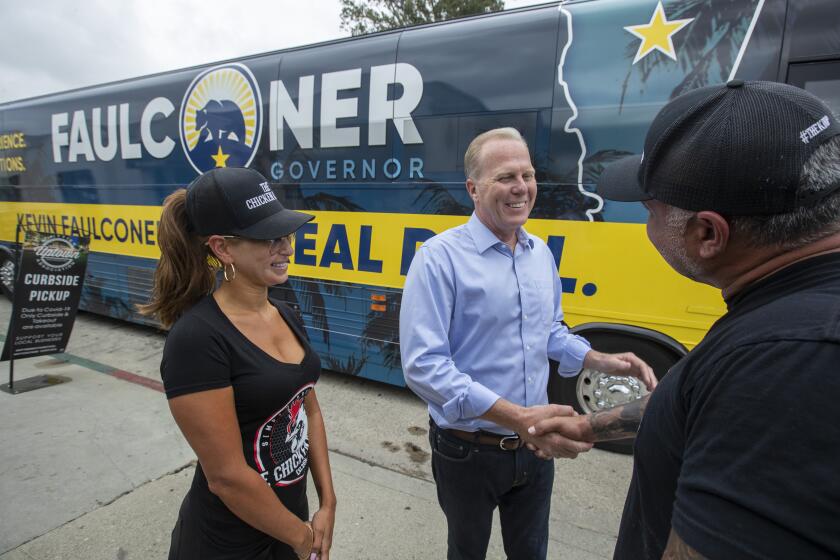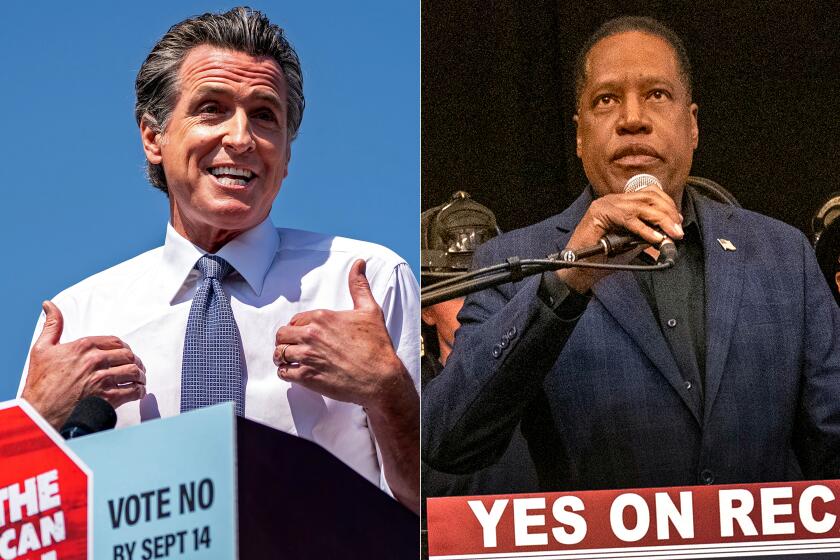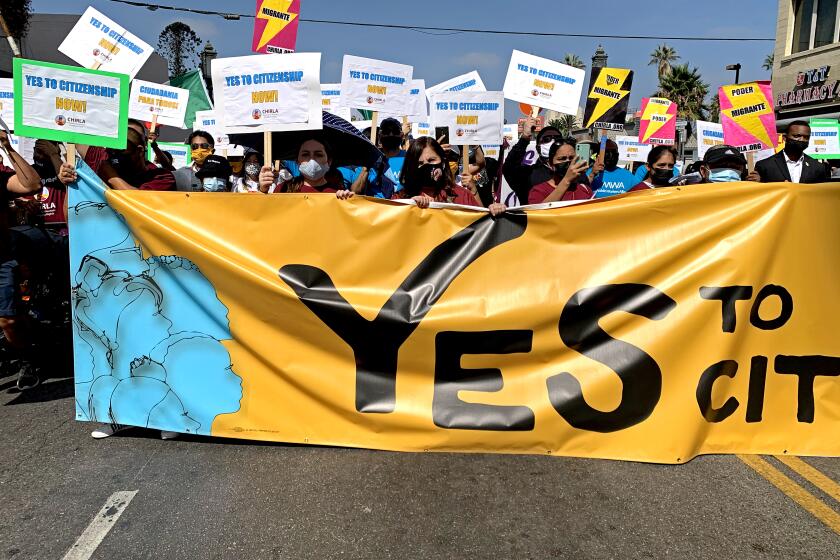Larry Elder’s outspoken conservative radio rhetoric is under scrutiny in recall election
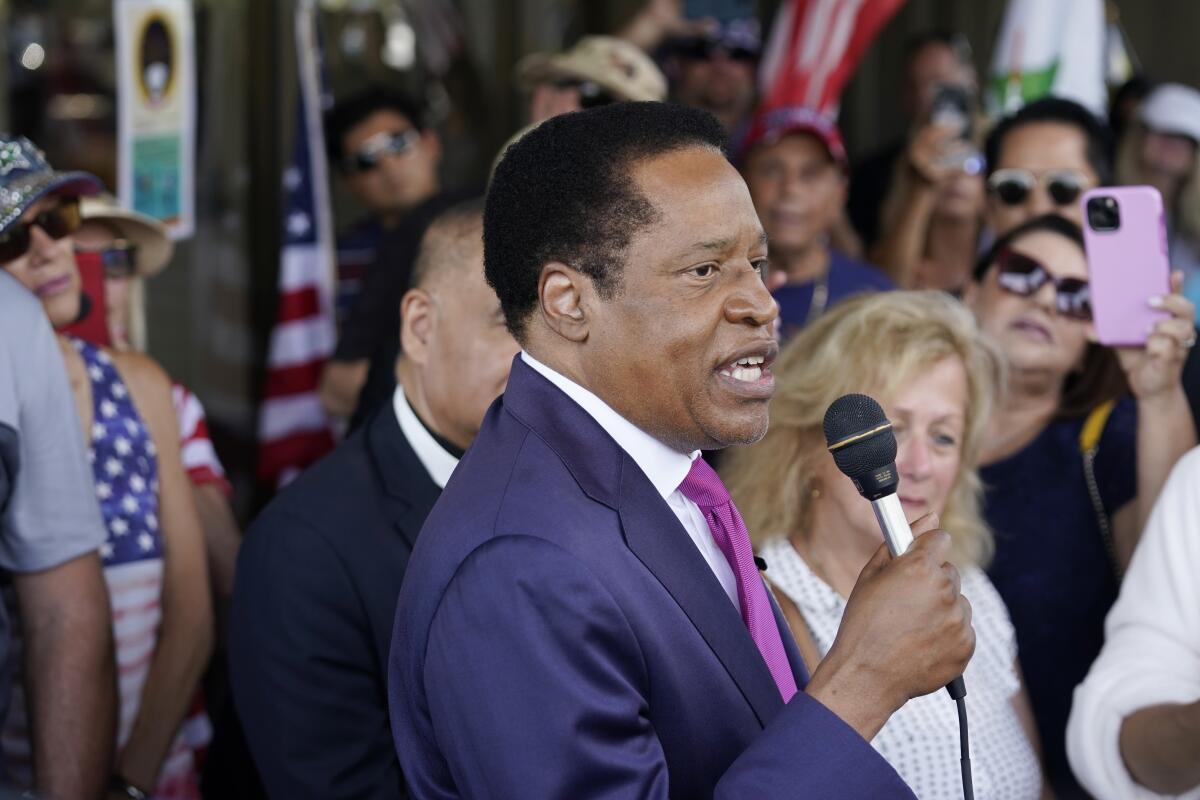
- Share via
He has on occasion fueled skepticism of climate change, depicting global warming as a “crock” and a “myth.” He has said the medical establishment and “professional victims” exaggerate the dangers of secondhand tobacco smoke.
He offered no pushback when a doctor last month called in to his nationally syndicated radio show to suggest that COVID-19 vaccines were dangerous and didn’t object when the physician implied that Bill Gates might have backed the “experimental” immunizations as a form of “population control.”
Larry Elder created a platform for those views in a media career spanning more than 30 years, epitomizing the convention-defying persona that has helped him seemingly leapfrog other candidates in the race to replace California Gov. Gavin Newsom in next month’s recall election.
On issues like smoking, climate change and the best ways to treat COVID-19, Elder has given airtime to misinformation and to views outside the scientific mainstream. That has inspired some observers, who say he would be a maverick leader, unafraid to air alternative views; it has alarmed others, who say his brand of libertarianism is too extreme, his policy musings too retrograde for liberal-leaning California.
Those conflicting realities have leapt to the fore, less than a month after Elder entered the recall race, and as journalists and rivals dive into his record as a talk radio host, as well as his books, newsletters and social media pronouncements.
He has called the Roe vs. Wade ruling, which created a legal right to abortion, “one of the worst decisions that the Supreme Court ever handed down,” described abortion as “murder” and said rules governing the procedure should be left to the states.
He said he would have voted against the law that requires employers to offer workers 12 weeks of unpaid leave to bond with new children or to care for family members with medical emergencies. He has rejected the notion that women confront a “glass ceiling” in attempts at career advancement and has embraced the libertarian truism that citizens have become too reliant on an overbearing government.
Last week’s debate between contenders in the gubernatorial recall election was missing the front-runner among the candidates seeking to replace Gov. Gavin Newsom: Larry Elder. Those who did show up to compete made no big mistakes, writes columnist George Skelton.
A recent interview with The Times suggested that his introduction to the California electorate will create even more provocative fodder. Elder implied that he might declare a state of emergency in order to fire “bad” teachers, estimating that they make up between 5% and 7% of the state’s public school faculty of about 300,000.
He added that he could declare another emergency to “suspend” the California Environmental Quality Act, the law requiring environmental review of building projects. He depicted the law as part of a bureaucracy that is “treating contractors and developers like they are criminals.”
Such measures would face monumental legal and political hurdles and would almost certainly alienate a large number of Californians. But they would be sure to thrill those who view Elder — the self-proclaimed “Sage from South-Central” — as a blast of fresh air in a state foggy with liberal “political correctness.”
But it appears that, on at least one topic, he wants to make clear he has moved away from a past view. Elder last week told opinion editors for the McClatchy newspapers: “I do believe in climate change. I do believe our climate is getting warmer.”
Elder would not answer detailed questions, and a campaign spokeswoman insisted that many of the past statements and positions highlighted by The Times were not pertinent to the recall.
“Some involve statements out of context, while others reflect prevailing notions of political bias,” spokeswoman Ying Ma said in an email. “For instance, there is a clear inability [to] comprehend why a talk radio host might want to allow a caller to express views different from his own, or why anyone would consider unconventional assertions presented by reputable researchers.”
Ma said the central recall issues should be “rampant crime, rising homelessness, out-of-control costs of living, water shortages, disastrous wildfires, rolling brownouts and repressive COVID restrictions.” The spokeswoman wrote in her email that The Times was conducting “opposition research,” with some topics dating back “many years,” in a way that mimicked “a (French) laundry list of attacks from the Newsom campaign.”
Under the unusual rules of California recall elections — wherein Newsom needs a simple majority of the vote to remain in office, while, if he falls short, Elder need only defeat other would-be replacements, no matter how small his plurality — Elder’s provocative views could actually advance his cause, and Newsom’s, experts said.
“These kinds of statements and issues benefit both Larry Elder and Gavin Newsom,” said Dan Schnur, a UC Berkeley and USC political scientist and previous advisor to numerous Republican candidates. “Elder needs only one more vote from conservative voters to prevail over other recall challengers. And his supporters will love these ideas.
“Meanwhile, it’s clear Newsom and his team have decided that — rather than motivating progressives by telling them good things about this governor — they are better off telling them frightening things about the person who might replace him.”
Schnur noted that some politicians who are viewed by large numbers of voters as extreme — like former President Trump on the right and Vermont Sen. Bernie Sanders on the left — used their plain-spoken personas to push their way into the center of the political debate.
Elder, 69, jumped into the race in mid-July, months after some other candidates, and immediately changed the dynamic. He became the front-runner in the polls and quickly raised significant sums of money, with a particularly strong showing among people who gave less than $100.
Between his July 12 entry to the race and July 31, he collected nearly $4.5 million, according to fundraising disclosures filed last week with the secretary of state. That’s more than every other GOP candidate except John Cox, who is largely self-funding his campaign.
A graduate of Brown University and the University of Michigan Law School, Elder leaves little doubt that he relishes a good debate.
“I can articulate these issues in such a way that Joe and Joan Six-pack can go, ‘OK, now I get it,’” he told The Times in the recent interview.
He said the seed of his gubernatorial candidacy was planted by his talk radio mentor, conservative Dennis Prager. Elder initially demurred, because he worried that the state had become “ungovernable.” But further research convinced him he could make dramatic changes, partly by invoking emergency powers, he said.
Elder said he believes that an “education emergency” declaration would spur reform, particularly for inner-city schools, and that a tiny number of teachers have been fired annually. “Unions are protecting bad teachers,” he said, “to the point where the worst ones get in the areas where the kids need them the most.”
Elder correctly notes that California removes fewer teachers than some other states, though its practices around teacher performance and retention are complex.
Tenure offers strong protections for teachers against removal after two years on the job. But a significant number of teachers leave the profession anyway, sometimes under pressure because of substandard performance. Some experts argue that the greater problem is the loss of effective teachers, many of whom protest a lack of support from their schools and communities.
“Someone told me that between 5% and 7% of public school teachers need to be fired,” Elder said, adding that an emergency declaration would provide “the power to get rid of bad teachers faster than the system allows.” He concluded: “Once you did that, automatically, education would improve overnight.”
Because Elder declined to field follow-up questions, it is impossible to know who had advised him on teacher terminations and exactly how he might weed out educators he judged to be underperforming.
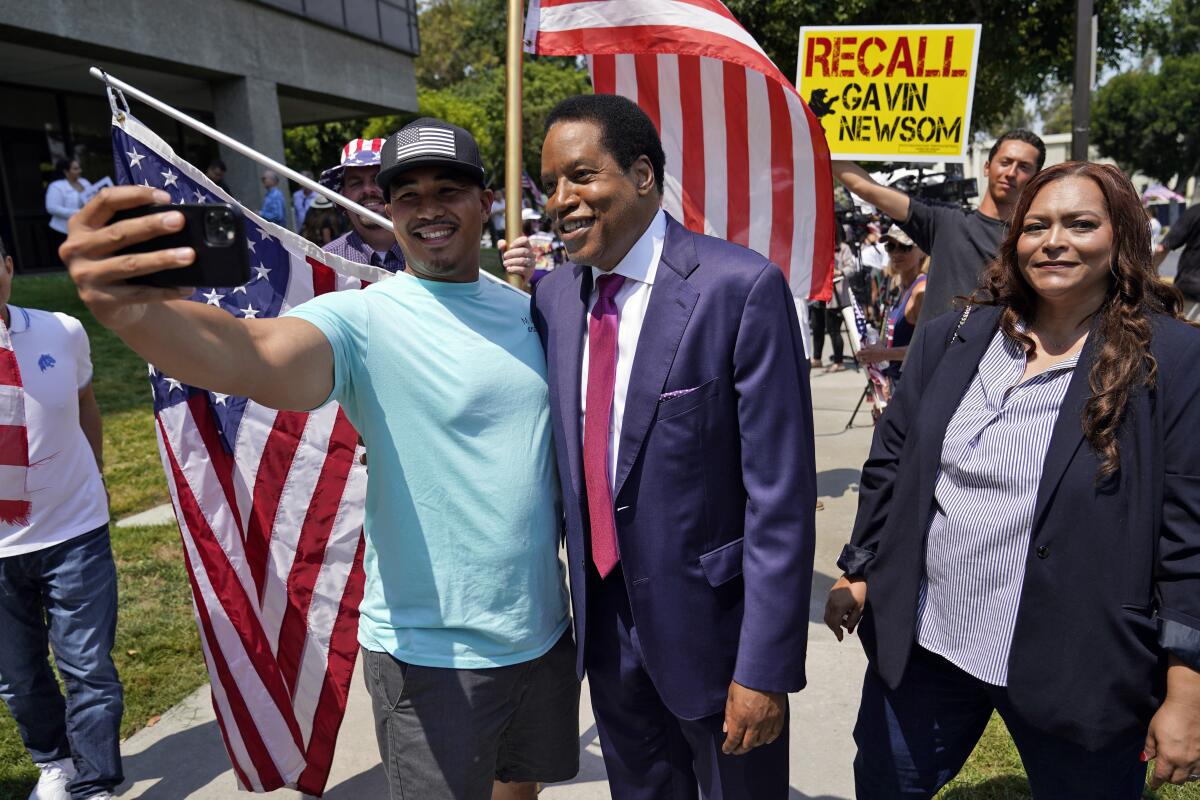
Similarly, Elder said in interviews with The Times and opinion editors at McClatchy newspapers that he envisioned an emergency action on homelessness that would allow him to waive the state’s environmental review law, “so that I can unleash the developers and contractors who would be able to build low-cost housing and low-cost apartments.”
He said many builders had moved their work out of California because the Environmental Quality Act “allows almost anybody to stop anything for any length of time.”
On the other most pressing issue of the day, the COVID-19 pandemic, Elder subscribes to the conservative view that the government and health officials should allow individuals to make choices about wearing masks. He has decried attempts to force people to get vaccinated.
He remained silent last month, neither agreeing nor disagreeing, when “Kathy,” a gynecologist who claimed no expertise in infectious diseases, called in to his radio show and said that vaccines could be a threat and asserted that unnamed individuals “are going to specifically target the minority areas first, and lower-income areas.”
When she spun out dark intimations about a Gates-organized plot to administer dangerous vaccines, Elder again did not respond. Instead, as first reported by HuffPost, a page on his website promoted the gynecologist’s pronouncements, saying, “You’ll want to hear this physician’s take on the vaccines.”
Questions about COVID-19 vaccines’ safety have led to hesitancy for some Americans. Experts say there is almost zero cause for concern.
But Elder has said he has been vaccinated (as an “old man” with “co-morbidities,” he told the McClatchy editors) and supports others who have done so. He added: “A lot of people have made the choice, rightly or wrongly, not to get a vaccine. And I think, in America, you want to have that choice.”
As with other topics, Elder prefers to focus the COVID-19 issue on Newsom, saying the governor hadn’t followed his own mandates, such as when he didn’t wear a mask while attending a party at the tony French Laundry restaurant. Elder’s website says business shutdowns have gone too far and “inflicted unnecessary pain on ordinary Californians,” adding: “I will govern as your governor, not as your tyrant.”
Elder’s views on other issues, like climate change, have been equally provocative. He recently contended that he has been either taken out of context or misinterpreted.
He once maintained a page on his website devoted to “debunking the Gore-Bull warming myth.” (A reference to Al Gore, the former vice president who has made the battle against climate change his life’s work.) The web page contained links to a list of stories, several rejecting the consensus of mainstream science: that the planet is warming to dangerous levels and that humankind is responsible.
Gov. Gavin Newsom and Democrats are singularly focused on Californians casting a “no” vote on the first part of the recall ballot. That may leave some voters unaware they can also choose a replacement in the event Newsom loses.
In a 2008 CNN interview, Elder called global warming “a crock” and disparaged Republicans, such as the late Arizona Sen. John McCain and former President George W. Bush, who disagreed. Elder rejected Bush’s contention that “global warming is this big peril to the planet,” concluding: “It is not.”
In his meeting with the opinion editors last week, Elder sounded a markedly different note, expressing his belief in a warming planet and adding, “I do believe that human activity has something to do with it.” He said he also believes that the warming is “a factor” in California’s worsening wildfires. But he added: “What I don’t believe in is climate-change alarmism.”
His 2000 book suggesting that the dangers of secondhand tobacco smoke have been exaggerated puts his views outside the scientific consensus.
The Centers for Disease Control and Prevention and U.S. surgeon general have long warned of the magnitude of that threat. The CDC estimated in 2014 that 2.5 million people had died over the previous 50 years from health problems caused by exposure to secondary smoke; that would average 50,000 deaths a year.
Elder’s provocative missives that drew little outcry when he was a radio personality may be viewed differently now that he is the front-running challenger to Newsom.
In 2017, Elder posted a picture on Twitter of three women attending the Women’s March in Washington to protest the inauguration of President Trump, who faced serial accusations of sexual assault and misconduct. Above the picture, Elder wrote: “Ladies, I think you’re safe.”
This drew immediate complaints that Elder was suggesting that the women were too unattractive to be sexually assaulted. A member of the Nebraska state Senate retweeted Elder’s post, then, facing a storm of condemnation, resigned his post. The original tweet was apparently deleted.
In a 2000 column for Capitalism Magazine, Elder asserted that Democrats had an advantage over Republicans because they were supported by women, and “women know less than men about political issues, economics and current events.” In the piece, he added that women could be misled because “the less one knows, the easier the manipulation.”
In the column, Elder cited research conducted at the University of Pennsylvania’s Annenberg Public Policy Center on “gender gaps” in political knowledge.
Surveys have detected such gaps and no clear explanation for them, said Kathleen Hall Jamieson, director of the Annenberg policy center. She said related research has shown that women are “factoring in other information and consistently making decisions at the ballot box that are consistent with their self-interests.”
Elder’s late entry into the gubernatorial race, about two months before the Sept. 14 vote on Newsom’s future, leaves relatively little time for voters to examine the candidate who has arguably the most voluminous record of public policy pronouncements.
“I mean, he has created his own opposition research for decades,” said Jessica Levinson, an election law professor at Loyola Law School. “On the other hand, he does have a shortened timeline here. I think what a lot of people just know is that he’s the Republican leading in the polls, and a talk-show host. There’s not a lot of details that are filled in; it’s basically a sketch.
“So has he been vetted?” Levinson asked. “Not in the way that we’re used to, of candidates having to go through a process of showing up to town halls and press conferences and respond to opponents, and provide answers and explanations for what they’ve said in their public life.”
Times staff writer Howard Blume contributed to this report.
More to Read
Updates
2:27 p.m. Aug. 10, 2021: This article was updated with additional editing.
Sign up for Essential California
The most important California stories and recommendations in your inbox every morning.
You may occasionally receive promotional content from the Los Angeles Times.


